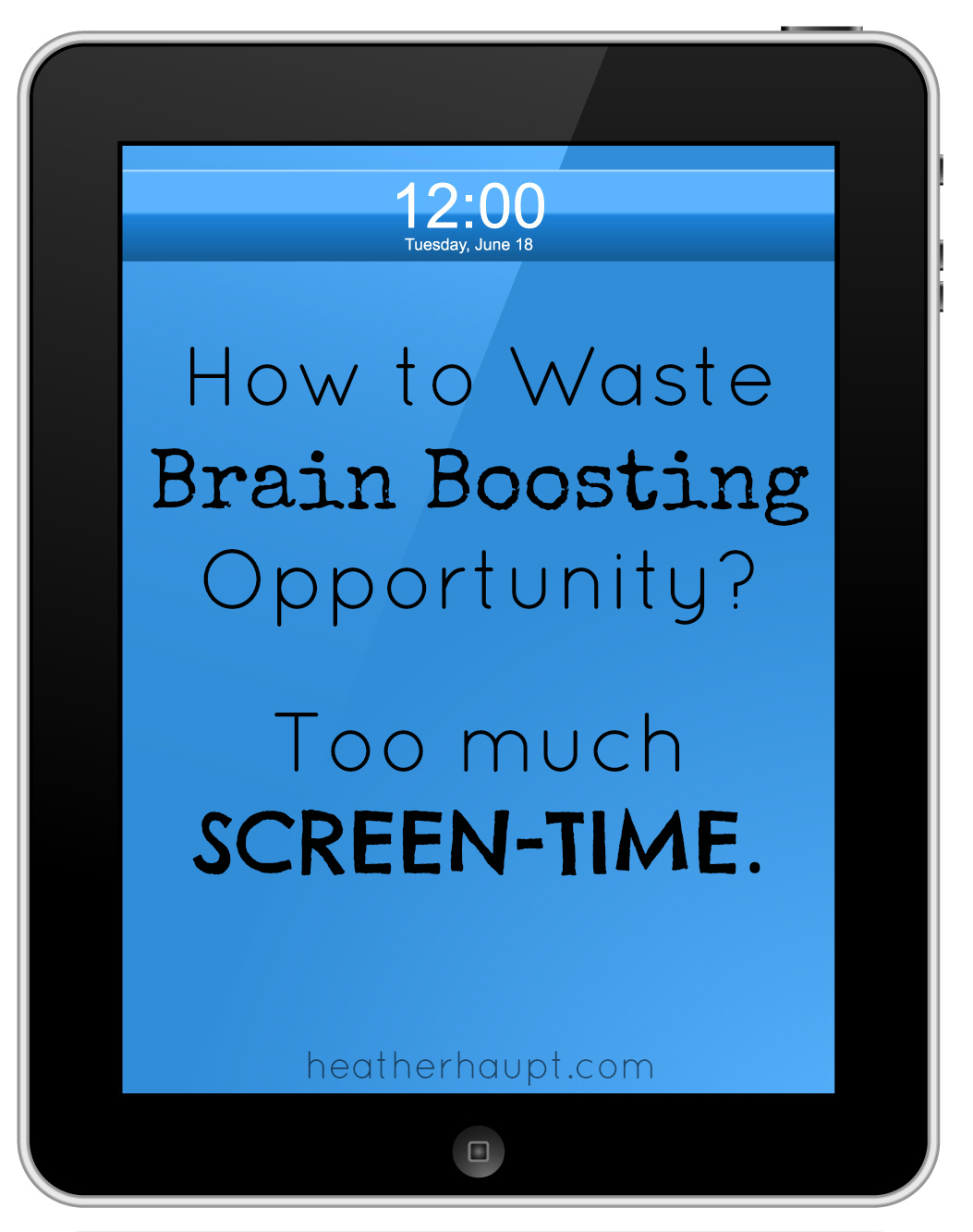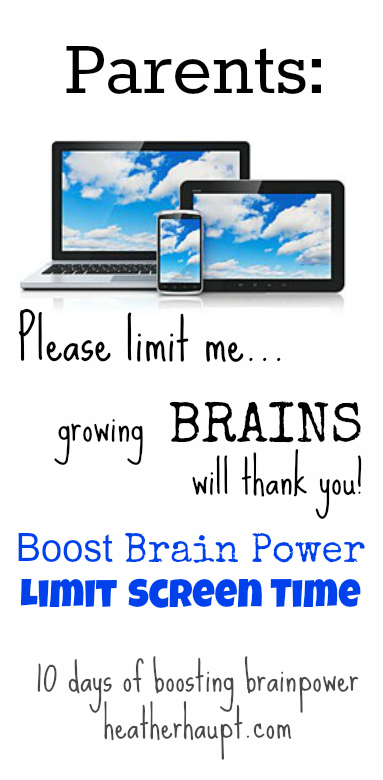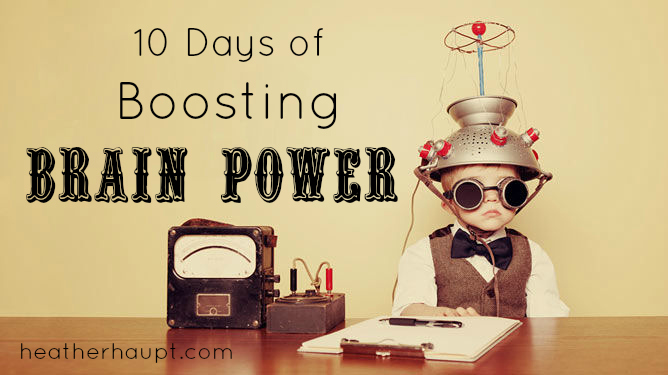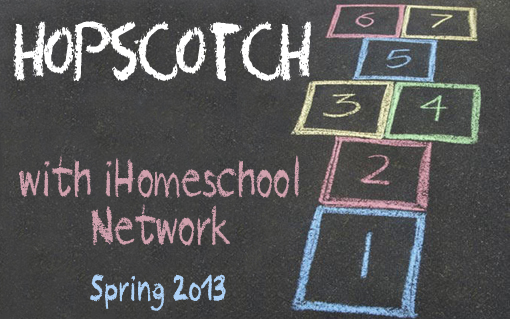
So we’ve been talking for the last week about boosting brain-power. Water, nutrition, sleep and exercise are foundational. When it comes to our educational environment, movement is the key to turning our children ON to learning. Friday, I wrote about how active, rough and tumble play contributes to wiring the brain to learn.
As much as movement turns the brain ON to learning, today I’m tackling the unpopular topic of how we turn their brains OFF to learning and rob them of the time needed for all of these brain-boosting opportunities…
Screen Time
Yes, the biggest culprit that kills active play and learning is screen time – and by this I include TV, movies, netflix, computer and touchscreens (like the ipad and iphone).
I think deep down, we all know screens are time-suckers and should have strong limits. But in today’s culture that is very hard to put into practice, isn’t it? So, let’s start with a fresh reminder of why we should limit screen time…
Why is Screen-Time So Bad?
- Robs Time ~ Watching TV (movies, etc) is a deprivational activity. It deprives us of the time and opportunity to do something more productive. For children – especially young children this critically inhibits the development of language and listening skills, imagination and various problem-solving processes that are essential in learning how to read. It robs all of us of opportunity for real-life hands-on exploration, creativity building and time spent exploring, talking (to real people) and real rather than virtual experiences. Time spent in front of a screen is time NOT spent doing something that builds the brain, builds relationships and builds a healthy, whole person.
- Slows Brain Activity ~ Remember when we talked about the cerebellum last week? Computer imaging of the brain has revealed that the cerebellum is almost entirely inactive during the passive activity of watching a screen.
- Lacks a hands-on, multi-sensory component that is critical to learning. When a person moves and interacts it fires up the cerebellum and speeds up the learning process.
- Lacks verbal, personal interaction. Children need to communicate WITH someone, not just having an impersonal ‘machine’ talking at them.
- Highly Addictive ~ A recent study came out that reveals that screen time produces a chemical response with dopamine in the brain similar to the affect of other addictive substances (drugs, sugar, cigarettes, etc). If you don’t think you or your children are addicted to your screen of choice, try taking it away for a day or even a week. It’s hard to do. Oftentimes, you’ll even notice withdrawal symptoms.
- Rewires the Brain ~ As scary as this sounds, researchers are finding this to be very true. Even actively engaging with screens when we are on computers and touch screens is having a rapid and profound affect on how our brain is wired. Researcher Gary Small said, “The current explosion of digital technology not only is changing the way we live and communicate, but is rapidly and profoundly altering our brains.” The Shallows: What the Internet is Doing to Our Brains explains that the very act of how we read and process information is changing when more time is spent learning ‘online.’ For instance, we lose the ability to focus and and read long articles. We develop what’s been coined “popcorn brain” where we are constantly hopping around from topic to topic without the ability to delve deep. For children in this season of intense learning the affects can be devastating.
The New Nanny
In this digital age, it is vital for us as parents to constantly be assessing where our families are spending time plugged-in and whether or not this is beneficial. TV or video game consoles were the default ‘babysitter’ of choice when we were kids, but now with the technology boon, we have the opportunity to keep our kids plugged in at the park, in the car, at the store, the waiting room. It’s as easy as handing over our smart phones or a tablet. But should we be handing over these devices every time we want to keep them quiet? Are we abdicating our responsibility to parent and to teach self-control?
But Aren’t Touch Screens Different?
With the explosion of smart phones and tablets, many schools are rushing to embrace a tech-centric approach to education and marketers are quickly saturating the market with all kinds of ‘educational aps’. Since they are ‘educational’ does this make them good? Well, the truth of the matter is that there is NO real research on this. The ap makers themselves assert the benefits, but this is not true research. It reminds me of the whole ‘Baby Einstein’ craze and then subsequent recall when complaints were filed stating that parking kids in front of educational DVD’s didn’t actually make them smarter, but harmed them.

So What to Do? Some Thoughts…
Take Stock ~ Take time to record how much screen time your family is getting. It is helpful to see how much and when you are using screens.
Assess ~ Decide what amount of screen time you want for your family. Each family is going to be different. For instance, we are a football family. We watch almost every NFL game that is aired on ‘regular’ TV (we don’t have cable). But the kids don’t watch any other TV, we don’t have Netflix and they only watch an occasional movie, maybe twice a month or so. In our family, we utilize a portable DVD player on the airplane. Being trapped in a metal tube 30,000 feet in the air with a hundred other people made plugging my kids into a movie sound like a great idea. When we drive however, I have the ability to pull over and address temper tantrums and help my children learn how to occupy themselves in the car without the need to plug in. Car time, provides us wonderful opportunity to talk and for them to observe the world flashing by them… So we keep our car screen free.
Cut Back – Just do it! We’re going screen-free next week. Want to join us? {This mama needs it just as bad as the kids!}
Constantly Reassess ~ Last week, I had to take all four kids with me while I had my teeth cleaned. I strapped Greta into the umbrella stroller and had snacks for her and then let the boys take turns playing Angry Birds. In hindsight, I realized that they are old enough now that I could have had them bring a book to read. We’ve trained them enough on how to sit still and behave that I didn’t NEED to use the screen.
Let us encourage one another in purposeful parenting – to minimize screen-time and maximize relationships and learning!

Day 1: Boosting Brain Power Starts with Food and Water
Day 2: How Sleep Makes Us Smarter
Day 3: Exercise Boosts Brain Power
Day 5: Active Play Boosts Brain Power
Day 6: How to Waste Brain Boosting Opportunity
Day 7: Brain Breaks: An Important Tool in Your Homeschool



Convicting post, Heather. I’d be interested in going screen free for a week. I’ll have to sneak to the library to blog! My husband and I were on a cruise in Costa Rica for a week recently with very little Internet. It was amazing.
Agreed. Lots of truth in there, and we are just starting to see to long-term effects of screen time.
Excellent post, Heather! Definitely not perfect at this one :), but I love the reminder to constantly reassess. One of the things that we do is very rarely watch TV or movies while eating. We save movies for a special family night. We too don’t have cable which has cut down our TV watching a great deal.
We have now moved into the video games era with our kids, so that has been a new challenge. But we are learning to read the signs of too much time! I agree that every family has to figure this out- we happen to be an NFL watching family too. 🙂
Thanks for this series and for tackling this tough issue!
I plan to assess my screen time. Thank you for the gracious challenge!
Thanks always, Heather for your words of wisdom. It’s such a good reminder because, although I fully agree with you, when I reassessed my day, I found that there was less of this good stuff than what I had planned. Truly, this advice to be a poster that hangs on my fridge!
I’m there all too often too. I think that’s why I must remind myself of the “why’s” so that I keep doing what we need to be doing…